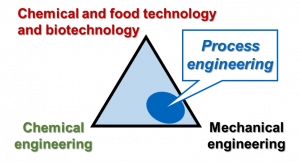„The variety and diversity of interconnection of the knowledge of processes and constructions – this is exactly our field of competence.“
prof. Ing. Tomáš Jirout, Ph.D.
head of the department

The Department of Process Engineering of the Faculty of Mechanical Engineering of the Czech Technical University in Prague is engaged in designing technologies, design and construction of machinery and equipment for food, chemical and process industries, ecology and waste treatment technologies. As for education, the department participates in bachelor’s degree programs Theoretical Fundamentals of Mechanical Engineering and Mechanical Engineering with scope to Process Engineering. The department provides full education in Master and Doctoral Studies with a focus on Process Engineering.
The field of Process Engineering is exceptional by ability to combine the knowledge of hydromechanical, heat and diffusion processes together with skills in construction of machinery and equipment. This enables to our graduates to work in R & D, design, production and maintenance. Our graduates can be found also very often as heads of design teams or companies, where they easily manage other professions. In the context with the Faculty of Mechanical Engineering, only few people can image global demand for our specialization and for such specific machines and equipment although they help us to form products without which we cannot imagine our lives. Specialization in Process Engineering is very attractive because as for formation of gross domestic product, our specialization covers more than 40% of total industry in global point of view.
The attractiveness of our broad scope of skills is hidden in the similarity of processes and apparatuses in individual production lines. For example, a distillation column can be found in both ethanol production and crude oil processing. Filters are used for sewage and gas purification, in beer production technologies, but they can be also found in any vehicle. Mixing equipment can be found not only in households, but also in chocolate plants, in paint production technologies, during tires fabrication, in reactors during plastics or nanocomposites preparation, or as chemical reactors, aerobic or anaerobic bioreactors.
The concept of education in our field is based on the fact that all production lines are essentially composed of functionally similar devices. Education is therefore firstly based on the understanding of the elementary processes occurring in the apparatuses (momentum, heat and mass transfer), the study of the construction of a specific apparatus (pump, heat exchanger, reactors, distillation column) and then integration of machines and equipment into production units and lines. Such a gained theoretical knowledge is practically used and applied in projects in cooperation with industry during studies.
